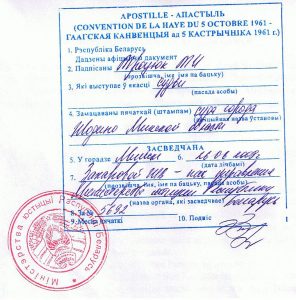Apostille Legalisation Service for Documents
Public documents, such as birth, marriage or death certificates or even notarized documents, are sometimes needed to be used abroad. However, before it is used elsewhere, the origin must be authenticated. The legalization process is typically costly and cumbersome as it includes a chain of processes.
An 'Apostille' certificate is attached to an official legal document to verify that the document is genuine and contains the signature of a natural person who is recognized and authorized to act on behalf of the organization that issued the document.
 When a legal document is presented in a foreign country, it can be tough to verify the legality of the document. The process for legalizing documents that can be used abroad was abolished in 1961, under the Hague Convention, and was replaced by a single certificate of authenticity, known as an Apostille. Each Apostille is identified by unique reference number, dated and registered.
When a legal document is presented in a foreign country, it can be tough to verify the legality of the document. The process for legalizing documents that can be used abroad was abolished in 1961, under the Hague Convention, and was replaced by a single certificate of authenticity, known as an Apostille. Each Apostille is identified by unique reference number, dated and registered.
Most people living in their country of birth, getting married to someone from that same country and working there too, it's unlikely ever to come up. However, should you decide to emigrate either permanently or for a short time for work reasons, get married in another country or have a child with dual citizenship, it may be necessary to prove who you are? For example, a German registrar wouldn't know if an Irish birth certificate were the real thing as they do not have access to Irish records. To do this, the Foreign and Commonwealth Office qualifies that they are valid UK documents prepared, stamped, signed or sealed correctly and issues the Apostille. This is a simple piece of paper that is attached to it and stamped as official. It is then signed by an official government officer.
Previous to the convention, there were no set rules, and different countries had different requirements, procedures, timescales and prices for legalizing documents. This caused confusion and difficulty, not to mention delays as some countries processed documents through the courts. As a solution, the convention was put into practice in 1961. Not all countries are signatories, but there are mechanisms set up with the embassies and consulates of the non-attached states to allow for the documents to be used.
You may be asked to provide legalized documents, attested documents, notarized documents, certified documents. Many terms are often misused when referring to document legalization. Ultimately, the Apostille certificate results in the paper being legalized for use in another country that is a member of the Hague Convention. Certification and notarization are often confused, especially by people in other countries where the notary system is different than that in the US. Please, always double check with the people requesting your documents before going down the notarization route as it can get prohibitively expensive, especially when not necessary.
When a country is not a member of the Hague Convention, documents are typically legalized with the Apostille before then being processed by the local embassy. The embassy will then add further certification or stamps to ensure the document is valid in their country.
LOCATIONS WE SERVE
Please click on a link below to see the cities we serve in your state. My Reliable Mobile Notary is expanding to more areas so check back regularly as we expand to a location near you.
